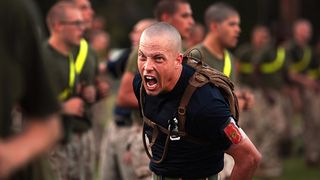Media
Why Soldiers Crave a 'Hero's Journey'
Understanding the desire for 'baptism by fire.'
Posted October 4, 2018
“How many times did someone have to run in front of a machine gun before it became an act of cowardice?” –Michael Herr, Dispatches
The notion that war is individually transformative is rooted in mythology, literature, and Hollywood war movies. Transformation in these mediums typically follows a similar pattern frequently referred to as the “hero’s journey.” A departure, initiation, and return sequence is made manifest as an individual undertakes a journey or a rite of passage, experiences a defining moment rooted in crisis, emerges victorious, and then returns home positively transformed by the adventure.
In 2010, the average age of those deployed was 33.4. Taking a look at the portrayal of war during the early, formative years of that population yields major films such as Full Metal Jacket, Glory, and Born on the Fourth of July. Of these three, however, only one frequently appears in contemporary conversation: Full Metal Jacket. The birthplace of modern-day memes, social media posts, and Animal Mother worship, this movie is part of the collective conscious of many in the Global War on Terror (GWOT) generation of veterans.
Moreover, it provides a convenient medium through which we can examine those denied their own hero’s journey. Equally beautiful and profane, Full Metal Jacket powerfully portrays the transformation of uninitiated, soft boys into experienced, hard men. Death of the old, weak self and rebirth as a stronger and more powerful self is expressed as the actual death of Private Pyle and the rise of Animal Mother.
Joseph Campbell, the man who developed and researched the concept of the monomyth (one story) and studied the “hero’s journey,” is also the author of Primitive Mythology (1968), in which the necessity of an “animal mother” for a shaman is established. The mother animal is a type of spirit that remains hidden until the snow melts in Spring—the literal death of a season reveals something formidable.

Like Full Metal Jacket, many in the veteran community have made the mistake of assuming that the only process of reincarnation as a new, more laudable self is through violence and brutality. In other words, the crucible of combat. Those who join hoping for ‘baptism by fire’ but who never experience war feel sidelined in their hero’s journey. Left to bear witness to glory but denied the opportunity to partake, is a population of veterans who served during a period of conflict but never in conflict.
For every man and woman, yearning to be tested, measured, and found worthy, they are left with the fantasy, but not the reality, of war. This perceived deficiency gives rise to a heady mixture of jealousy, loss, shame, frustration, and rage. The military process, from recruitment to End Term of Service (ETS), primes service members for the expectation of action, discharge of duties under fire, and a celebration or culmination of the experience. Failing to experience the crucial step of this transformative process, combat, feels intolerable and isolating when so many others encountered it and capitalized on their experience “as a combat veteran.”
The irony is that the crisis of denied hopes and dreams is also fertile ground for transformation. Psychological death, or ego death, is the complete loss of subjective self-identity. In the same mythological framework as the hero’s journey, ego death is a phase of total self-surrender and transition. The ‘warless warrior,’ is, in fact, not without a war, it’s just a different one than they bargained for.
Furthermore, it is a fallacy to presuppose that combat always results in the kind of transformation depicted in myth, movies, or on social media. Metamorphosed, Animal Mother is an excellent killer but he is likely poor at what makes us most human—love and connection. Left devoid of the requisite humanness that makes life worth living post-combat is no transformation at all. Rather, it is a degeneration to our most base selves.
The military prizes, promotes, and trains physical courage for obvious reason. It is less proficient at emphasizing the necessity and difficulty of demonstrating moral and psychological courage. Yet as we move away from the longest wars in our history, the large majority of our military will not deploy. It will be at our own peril if we fail to contextualize for aspirant warriors that we cannot promise a war but we can guarantee a fight. The challenging and measuring of self can still occur without a discernible, physical enemy. Combat can be a defining moment in life, but so can many, many other things. Sometimes, the greatest adversary we face is the one that stares back at us in the mirror.


